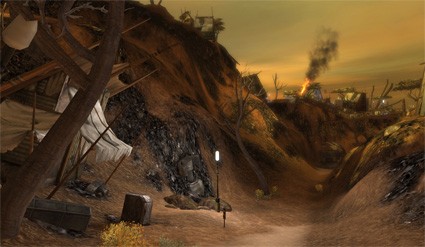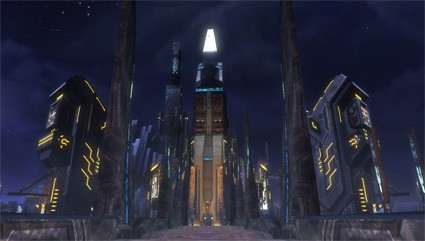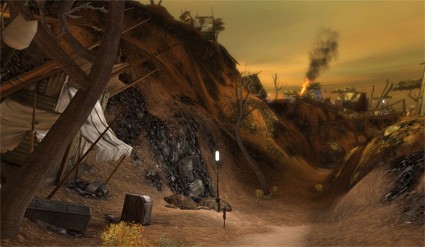
Editor’s note: Splash Damage’s Erin Ali shares some of her insights on getting over a bad job situation. While you may not work in the game industry, her observations can apply to anyone who loses their job because of economic issues or other situations beyond their control. I know that I shared a number of these feelings — and still deal with some — after the layoffs that I’ve endured this year. -Jason
We’ve probably never met, but considering how small the gaming industry is, there’s a chance we could. I don’t know you from Adam, but if you’ve been let go from a floundering company or felt the sting of economic hardship from a studio closing down, we probably understand each other pretty well.
It’s like a society no one really wants to become part of, and somehow most of us have been shoved into it.
Developers lose their jobs for a variety of reasons, such as downsizing the scope of a project, money issues, or exec troubles. And we all have our stories — the tales that we share over lunch, a meeting, even an interview…. By now, time’s passed, and we probably laugh it off when the topic comes up.
But sometimes, it’s hard to see just how much the loss of a job affects us.
 The Downward Spiral
The Downward Spiral
It’s no secret that Cheyenne Mountain Entertainment, my former company, had financial issues. As a result, I had to find somewhere else to work. I tried to stay as long as possible, but I found it incredibly hard after nearly five months of scraping pennies together and losing my sanity trying to keep a team together. I eventually landed another job and have been there ever since.
Even after nearly a year since my departure, the memory of an incomplete project and an obliterated team still haunts me. If I ever mention a colleague from my former job, I still refer to them as “my studio head” or “my technical director.” I still seem to reflect back on old times with coworkers that make me feel pretty happy, regardless of the reasons why I left the company. Knowing the issues that my former employer had, my colleagues get confused about why I’d ever think back to my old position and miss it.
It wasn’t the team. It was never the team.
 I couldn’t make a living any longer trying to work at a company that had a hard time keeping its head above water.
I couldn’t make a living any longer trying to work at a company that had a hard time keeping its head above water.
Being a producer and having to watch your team morale sink daily — and not being able to do a thing about it — as everyone else on that sinking ship tried to find new jobs or choose to stick it through is one of the hardest things that I’ve gone through.
Being able to say that the product failed because the talent couldn’t produce on time might have been different. People from the team might’ve accepted failure on those terms, or at least they could’ve taken responsibility for failing.
But when a product fails because the money just isn’t there, that’s not a mark against the team’s efforts or the product’s quality. It’s like watching as someone comes and destroys your sand castle as you’re still building it. You’ll never know just how cool it could’ve been. In the end it’s just some work that’s been destroyed, and there was nothing you could do to save it.
So in short, it sucks.
But we survive. The thing is that we have to watch out for how it affects us and make sure we don’t let it stop our attempts at moving on.
 My Wake-Up Call
My Wake-Up Call
The conversations held with former coworkers are like survivor stories. We reminisce over our old jobs, talk about how things have changed, and discuss any current events in industry or news of our former employers — if they still exist.
In those moments there’s always this eerie feeling that washes over you; any sadness or anger you might have felt before comes back. And these are dangerous waters to wade in.
To be honest, I never truly let go of that anger, and as a result I zoned out on my personal life. I stopped taking care of myself and training for sports events, and I just made the excuse that “I have to work” to skip any social opportunity. I did this as a way to keep myself engaged at work and away from anything else. The fear was that somehow I’d lose this job, too, and I had to do anything in my power to keep it.
And it took a handful of friends, family, and coworkers to make me see that I had a problem. I was way beyond the line of being burnt-out and saw no end in sight. They helped me see that overworking and trying to take care of everything myself was my own way of trying to ensure, hands down, that I don’t encounter a repeat of my former company. It didn’t matter that what happened at Cheyenne was out of my control; I felt that I had to do whatever I could to keep my job.
 The issues at Cheyenne left a good number of people in some form of emotional distress in its wake, and probably the same goes for any other company in the industry (and other industries) that has closed or still struggles because of financial reasons.
The issues at Cheyenne left a good number of people in some form of emotional distress in its wake, and probably the same goes for any other company in the industry (and other industries) that has closed or still struggles because of financial reasons.
But from one survivor to another, such issues shouldn’t become the reason you leave this industry. The economy blows, and the game industry isn’t the only sector to suffer from this. Even after we get past the recession, there’ll be other reasons for a studio to close or someone to lose their job. The trick is to not let it completely overwhelm you.
Remember Why You’re Here
As I discovered the hard way just how much my departure from Cheyenne affected me, I realized that I had to do something to move on. If you’ve found yourself in this position, you’ve probably done the same things that I’m doing now.
 • Remind yourself why you’re in the industry. Think of the first time you saw one of your products on a shelf or when you saw highlights from a convention. Remember team-building events or even the struggles of developing a product. Everything you’ve worked for has made you who you are — even the experience of working for a struggling company. Embrace it, and become stronger because of it.
• Remind yourself why you’re in the industry. Think of the first time you saw one of your products on a shelf or when you saw highlights from a convention. Remember team-building events or even the struggles of developing a product. Everything you’ve worked for has made you who you are — even the experience of working for a struggling company. Embrace it, and become stronger because of it.
• Establish a work/life balance. Working yourself into a hole and cutting out all forms of a personal life is the fast-track to burning yourself out. Play a video game to just play a video game (don’t dissect it, although you might be dying to). Get a hobby, or better yet, resurrect an old one. For me, I’m resurrecting my love of running and taking on my desire to become a triathlete. I also played the crap out of Halo 3: ODST.
Accept That These Things Happen… and Could Happen Again
I don’t think we ever fully get over incomplete projects or closed studios. I’ll always wonder what would’ve happened if our team shipped Stargate Worlds, and I hope all of my former colleagues are happy with their jobs, even when I miss seeing them and working with them.
What we need to realize is that what happened was out of our control, and reflecting on it and wishing things could’ve been different won’t ever change things. It probably makes things worse.
 The industry isn’t full of constantly closing studios, and today’s troubles shouldn’t be a deterrent in deciding where you go — instead, it should help you appreciate where you land. Since I left Cheyenne, I’ve been pretty lucky to end up with my current employer, and I’ve also grown as a producer.
The industry isn’t full of constantly closing studios, and today’s troubles shouldn’t be a deterrent in deciding where you go — instead, it should help you appreciate where you land. Since I left Cheyenne, I’ve been pretty lucky to end up with my current employer, and I’ve also grown as a producer.
I’m not a firm believer in that “things happen for a reason” adage, but when things do happen, please remember that you’re a strong individual in an amazing industry. Don’t ever compromise yourself because of a situation you had no control over, and move on. Above all else, remember who you are and do what you need to do to make yourself happy.
If we do ever meet, and you’re in the same situation as I was, we’ll probably chat about it, maybe laugh it off, and go our separate ways. But this time, let’s leave that conversation where it belongs and move on with our lives.


